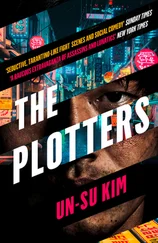Now the questions have moved on to the store Mr. Lee currently owns. Suzy translates with mechanical efficiency, as though each question simply filters through her, each word automatically switching from English to Korean.
“How many employees are there in your store total, including both day and night shift?”
The ADA is looking through his notes. Suzy wonders why he asks such questions, when the answer must be right at his fingertips.
“Seven, including myself.”
Mr. Lee is no longer thinking about Suzy’s parents. He’s back in his own fruit-and-vegetable store on Grand Concourse, where the underpaid illegal immigrant workers must be slaving away twelve hours a day, seven days a week, much the way he has been doing since he arrived in this country.
“Can you name the workers and their responsibilities, along with their salaries, weekly or bimonthly, however they are paid?”
So the issue at hand must be the violation of the minimum-wage law, for which countless Korean store-owners have come under scrutiny lately. Some have been forced to shut down, some so bombarded with back payments that they deteriorate into bankruptcy. Suzy has served in several depositions brought on by the union. She once overheard the lawyers gossiping about how the Labor Department has been tightening its watch, something about the elections coming up and the mayor needing a new shakedown. “Get them behind bars or back in their own country,” one lawyer chortled, imitating the mayor, known for his tough-man act.
Mr. Lee is rounding up the names now. Jorge, Luis, Roberto, inevitably Hispanic names. The hierarchy becomes even more marked. The white prosecutors, the Korean store-owners, the Hispanic workers, and Suzy stuck in between with language as her only shield. He is now producing the record of all payments, scrawled in ink, for workers are always paid in cash. Of course they are. How many of them actually have working papers or even bank accounts? How many are legal in this country anyway?
Suzy is desperately hoping that the questions will go back to five years ago, back to when this man had worked for her parents, while they were still alive, while they were still swearing to disown her. But the ADA is zeroing in now. This is the moment the investigation has been leading up to.
“No benefits, no sufficient evidence of pay, no adequate vacation or sick days. Have you, Mr. Lee, been exploiting these illegal immigrant workers?”
The questions become more accusatory as they drag on, well into the late afternoon. When the assignment lasts this long, which must mean something serious, it is the interpreter who tires the most. The ADA only asks, and the witness answers accordingly, but the interpreter must do both, must keep her ears open at all times. Mr. Lee says nothing in return, and James Richards lets out a deep sigh, twirling the pen faster. Each question takes her a bit longer to translate. She is beginning to slow her words. They have been doing this for over three hours.
“Can you describe to me again the ways in which you hire and fire your workers?”
He has asked that before. The answer could only be just as tedious. Through word of mouth, Mr. Lee will say, through acquaintances I find them, and I let the worker go when he’s not good. How predictable, such a question, such an answer. So, instead, Suzy makes up her own question, surprised even as the words escape her lips.
Five years ago, you said, you worked for people who are now dead. Can you describe to me what happened to them?
Mr. Lee casts a quick glance at the ADA’s face, as if slightly confounded by such a turn of questioning. But he appears unsuspecting and gazes at the wall as if reaching back to five years ago, which is exactly what Suzy wants to see.
“They were killed. I had stopped working for them by then, been fired, actually. I only heard about it later. It was all over the Korean news.”
Turning to the ADA, Suzy repeats the same response Mr. Lee had given previously. Her heart is pounding. She cannot stop herself. She is being guided by an impulse that is beyond her. James Richards nods, as though he’s been expecting such an answer. Undeterred, he continues. “Mr. Lee, when a new employee is hired, do you offer him a set amount of time for training?”
Training, what a useless question. These jobs don’t require sophisticated skills. Just strong muscles and a willingness to sweat for a bit of cash.
Instead, Suzy asks, What was the nature of the murder?
Mr. Lee answers grumpily, “They said that it was some sort of a random shooting. But I wouldn’t be surprised if it wasn’t. I shouldn’t talk this way about the dead. But that Park guy, he had it coming to him.”
Mr. Lee does not notice Suzy’s face turning pale at his last words. She needs to register this information quickly, discreetly. She faces the other and gives him what’s been answered before. Yes, she tells him. Yes, for about a week, all the new worker does is watch how the work gets done and do whatever the others tell him to do.
James Richards sees nothing. He is setting up the next question. He seems to be moving toward his mission: get them behind bars or back in their own country. The evidence is all right here in this terrible man who cheats on those illegals who should be sent back to their country immediately. What’s the INS doing?
“Mr. Lee, can you describe the manner in which a worker is fired at your store? Do you offer him unemployment benefits?”
What does he think a fruit-and-vegetable market is? A Wall Street office? A nine-to-five, suit-and-tie job? Does he actually assume that working twelve hours a day, seven days a week, comes with that kind of privilege? Does he believe that the same rules apply to those who don’t have the right papers, don’t speak a word of English? Does he believe that the American dream is that easy? Unemployment and health benefits? They were never designed with these immigrant workers in mind. No one, not even the owners, have those!
So, instead, Suzy asks, What do you mean? What makes you believe that the shooting was not random?
Mr. Lee spits out the answer, as though the whole business is distasteful to him: “He had friends in all sorts of places. He and his wife, they were up to something.”
It is clear that the man is not enjoying these questions. What had her parents done to evoke such strong feelings?
James Richards is patient. He keeps on. He wants evidence. Not those scribbled notes the man has brought with him, but a record, a receipt, an invoice, none of which seem to exist.
“Mr. Lee, how would you notify your worker when he is being fired?”
But Suzy barely hears his question as she asks instead, Why did they fire you?
Mr. Lee’s face reddens a little, as if he cannot control the sudden rage as he recalls, “That Park guy had it all planned. He owed me two months’ pay, so he decided to throw me out instead. He looked as though he could kill, the way he screamed what a lazy lout I was, so I walked out. I took off my apron, which they made me wear for the work around the salad bar, and just walked out. Of course he never paid me, and I didn’t pursue it. I knew I didn’t want to mess with him. I’d seen what happens to guys who stand up to him, like this delivery guy out in Queens, Kim Yong Su I think his name was. Man, was he really screwed by that Park guy! Let me tell you, half the Korean community didn’t exactly shed tears when they heard about his death!”
It is hard to keep her composure, but Suzy must try, improvising an answer as long as the heated monologue. She repeats what Mr. Lee had said earlier, about firing a worker when he’s not good. She repeats it a few times to make up for the length. It actually works, this repetition, and discourages the ADA from poking into what is quite simple and obvious.
Читать дальше












